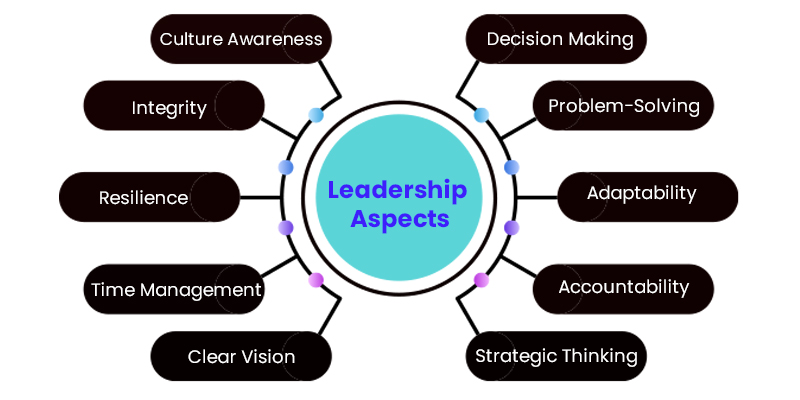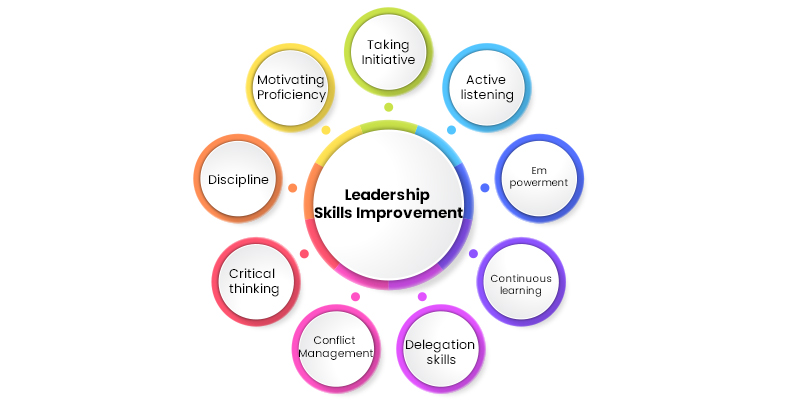Employers and organizations seek individuals who can excel in their roles and inspire, guide, and lead others towards shared goals. This is where strong leadership skills come into play. So this blog will guide candidates seeking freshers jobs on what leadership skills are, their importance, and how to improve your leadership skills.
Leadership Skills
Leadership skills are defined as abilities that enable individuals to effectively guide, inspire, and influence others to achieve a common goal or vision. These skills are essential in diverse contexts, including professional settings, community involvement, and even personal relationships. Leadership skills involve a wide range of attributes and behaviors that empower individuals to take on leadership roles and make a positive impact. Leadership skills can be developed over time through learning, practice, and real-world experiences. Leadership skills play a significant role in an individual’s career Advancement. Technical skills and a college degree may only take you so far. To be an efficient leader and help move your career forward, you require soft skills, like the ability to be a good listener and to have good communication skills. There are a lot of core leadership skills that are considered essential aspects to help you become a more efficient leader. It can be anything, such as taking initiative, enhancing critical thinking skills, or learning how to motivate and empower those around you. You must constantly challenge yourself to enhance your leadership abilities.
Aspects of Leadership Skills
The hard skills that you will need to succeed will differ depending on your work culture. But in a lot of industries, there are soft skills that can develop your career and improve your ability to land leadership roles. By showing that you have the ability to be a leader, you have to fast-track your career. If you’re looking for new job opportunities or promotions, you will get to your desired position if you have a steady track record of success in leadership roles in your professional and personal life.
- Decision Making
- Problem-Solving
- Adaptability
- Accountability
- Strategic Thinking
- Clear Vision
- Time Management
- Resilience
- Integrity
- Culture Awareness
Importance of Leadership Skills
Leadership skills play a pivotal role in professional and personal growth, contributing to success across diverse fields. Leadership skills are a key factor for professional excellence and personal growth. They empower individuals to inspire, guide, and influence others positively, contributing not only to individual success but also to the success of teams and organizations. They are essential for thriving in today’s complex and competitive landscape. Whether you’re aiming for career growth, contributing to your community, or simply aspiring to be a positive influence, cultivating leadership skills can make a great impact on your journey toward success and fulfillment.
Are you looking for any job opportunities in Coimbatore? Look for job vacancies available in that city. Visit fresher job openings in Coimbatore to find job opportunities that are relevant to your skills and interests.
Leadership Skills Improvement
Improving your leadership skills is a valuable investment in your personal and professional growth. Remember, leadership skills evolve as you gain experience and insights. Regular self-reflection and a commitment to growth are essential to becoming an effective and influential leader. Let’s look at the tips for how to improve leadership skills.
Taking Initiative
It’s important to take on more responsibilities voluntarily. Prioritize the acquisition of skills outside your primary expertise, embracing continuous learning. To avoid getting too comfortable, try doing things that make you a little nervous and find challenges that help you grow. When you have more to do, you also have more chances to learn. Learning new things and being open to taking on bigger tasks can help you become a leader at your job. This shows others that you’re proactive, continuously learning, and using what you learn to make things better. Your credibility as a future leader heightens due to your established track record of seizing initiatives, displaying a hunger for ongoing learning, and translating that newfound wisdom into tangible enhancements.
Active Listening
Communication skills are essential to develop effective leadership skills. Whether you’re talking in front of your team, making plans, or talking to employees and clients. One of the most required communication skills for a leader is listening. Without listening skills, you won’t be able to get feedback from others and get a sense of what team members like about the projects they work on. Most of the time, Managers and leaders should hire people who have more knowledge in certain tasks or specialities. Listening to your experts will help you understand what can and can’t be done. If needed, have a private talk with them to hear their concerns so that you can all move forward together. Getting feedback is really important. To listen well, look at the person you are talking to, don’t get distracted, and reply appropriately. Remember, communication isn’t just talking. But it also includes paying attention to how people move and use their bodies to understand what they’re really trying to say.
Motivating Proficiency
A real leader should motivate and influence people in a positive way. When coworkers or employees start feeling less ambitious about their work, a true leader should motivate them. But how do leaders do this?
First, they understand what people need. For instance, if someone feels sad because they think their hard work isn’t noticed, a good leader will talk to them and give them the recognition they deserve.
Sometimes, people lose their motivation because they find things difficult, or they’re tired of doing the same things over and over, or they’re upset they’re not asked to help. A good leader will monitor team members, listen to them, and encourage them to be more involved.
Making the workplace positive also helps. When people achieve goals, like getting new clients each week or doing a week of work without mistakes, a leader can reward them. This helps people relax and know that their efforts are valued.
Empowerment
Leaders should learn to understand how valuable their team members are. They should learn from them and also inspire others to learn from them. It’s good to learn new things from people who know a lot about that specific field or area.
If an employee comes up with a new idea, leaders should support it and see how it goes. Be a big supporter of their idea. By believing in them, you can help them feel more confident. Notice when an employee is taking charge just like you did when you were starting out and working on your skills and leadership abilities.
Discipline
Discipline is very important in order to achieve your goal. Even if you have a great idea and vision towards your goal, it won’t work without discipline. Discipline means sticking to your plan and doing things properly. For instance, imagine you and your team wanted to make a plan to get investors for your business. You had many ideas, but you didn’t practice the presentation. When you had to show the plan to the investors, you couldn’t explain it well. As a result, the investors will decline your proposal. To be a good leader, you must be disciplined and make sure your team is, too.
Continuous Learning
When things are changing quickly, it’s pivotal to keep learning and pushing yourself to gain more knowledge. Look at other leaders and how they act, talk, and behave. You don’t have to copy them, but you can add some of their good qualities to your own way of doing things.
Critical Thinking
As you seek a higher position, it’s important to develop your Critical thinking Skills. It is important to think carefully and see problems before they come up. A person with great leadership skills can even identify ways to stop problems from happening. They’re also good at spotting opportunities for the company and the employees to do well. Instead of waiting for things to happen, they expect them and help the team prepare in case something goes wrong. If you’re a leader and someone tells you about a problem, you have to work with them to figure out why it happened and find a way to resolve it so that it won’t lead to any trouble for the employees, the company, and the customers.
Delegation skills
A good leader doesn’t try to control everything. Instead, they give tasks to their team and let them feel strong. If you do this, your team will feel like they’re part of things and can learn new things. Sharing tasks will also help you focus on your own goals. Even if you’re leading a project, you still need to make sure the work gets done. That’s why when you share tasks, you should keep an eye on the project and give jobs to people who can do them well. It’s important to be clear about who does what, who’s responsible for what, and when things need to be finished. This is really important for sharing tasks and finishing a project.
Conflict Management
Leaders need to deal with tricky individuals and fix problems between people. If there’s a worker who isn’t doing their best and is always negative, leaders have to talk to that person in private.
Leaders also need to be honest and clear, which takes a lot of courage. It’s not easy to point out problems or resolve them. So, it’s important to hear what the worker has to say before making decisions.
Infosys offers a wide range of job opportunities for freshers. Candidates can visit Infosys Jobs For Freshers to apply for job roles that are relevant to their skills and abilities.
In conclusion, excellent leadership skills play a major role in your career development. While hard skills are essential for specific tasks, it’s the soft skills of leadership that truly set you apart and open doors to new opportunities. So, in this blog, we discussed leadership skills, its importance, and tips for improving them.






